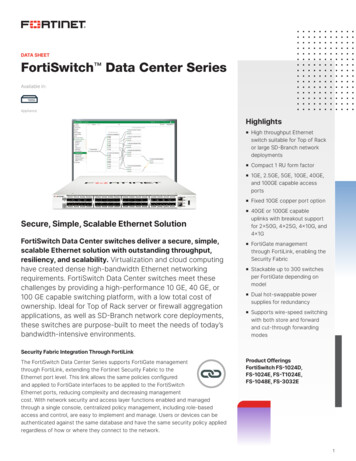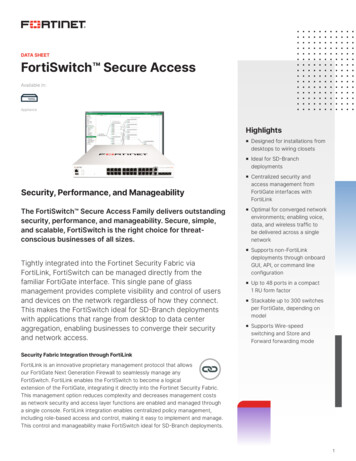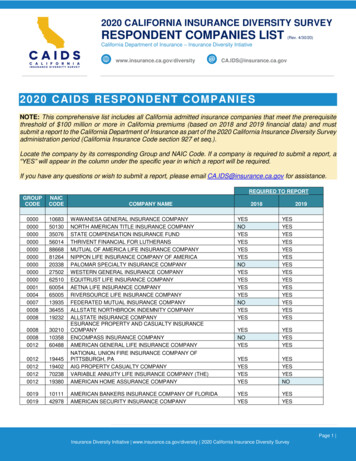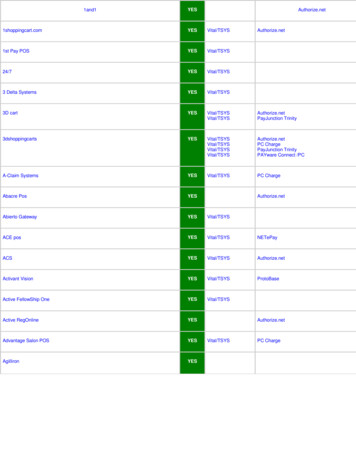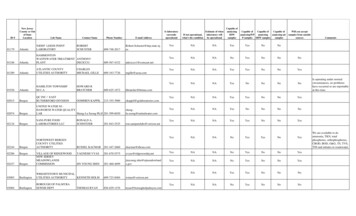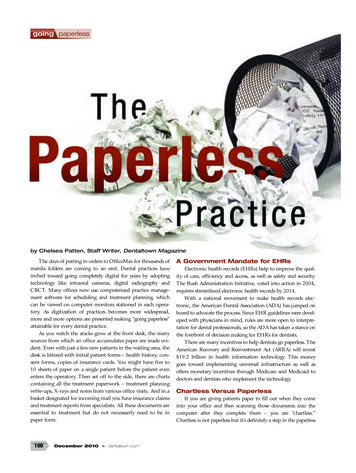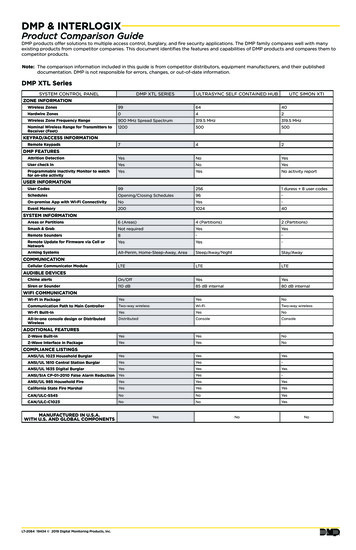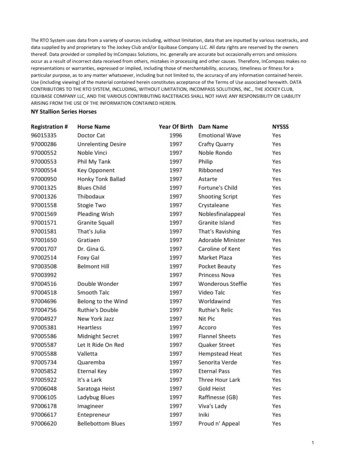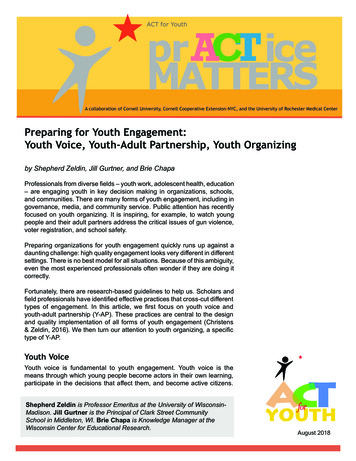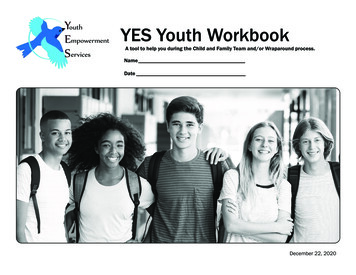
Transcription
YES Youth WorkbookA tool to help you during the Child and Family Team and/or Wraparound process.NameDateDecember 22, 2020
IntroductionThis workbook is designed to help you organize your thoughts about who you are and what youwant. As you start working on your very own coordinated care plan, you have the chance to tellall of the people who will help you what you like, what you want to avoid, and how you want towork towards your goals.Please write all over this workbook, draw on it, add notes, and make it yours. You can alwaysprint more copies, or add more pages if you need more room.If you are unsure how to answer a question, that’s OK. Just put down thoughts that areimportant to you. You can change the question if you don’t like it, add details it didn’t ask for, orskip the question altogether because the intent of this workbook is to help you be ready to helpothers understand what you want to help you reach your goals.YES Questions or Complaints1-855-643-7233Youth Empowerment Services (YES) is prohibited from discriminating on the basis of race,color, national origin, disability, age, sex, religion, or political beliefs.We provide free services to help you communicate with us, such as text in other languages, largeprint, or you can ask for an interpreter. To ask for help, please call 211.Español (Spanish) ATENCIÓN: si habla español, tiene a su disposición servicios gratuitos deasistencia lingüistica. Llame al 211.If you are having a mental health emergency, or you think you are in danger, pleasecontact 9-1-1 or go to your local emergency room.If you are considering suicide, or just need to talk to someone about how you feel,please call the Idaho Suicide Prevention Hotline at 208-398-4357 (HELP).(24 hours a day, 365 days a year) or text (3 pm - midnight, Monday - Friday)yes.idaho.govYouth Empowerment ServicesYou can also call the national Suicide Prevention Lifeline at 800-273-TALK (8255)and speak to someone 24 hours a day, 365 days a year.2
First NameMIPreferred NameLast NamePreferred PronounWorkbook Completed OnBirth DateHome PhoneAgeCell PhoneAddressCityZipEmailPreferred Contact Method: EmailTextCellHome PhoneMailWho would you like to be part of your planning team? Do you have any friends, family members, trusted adults, or community members youwould like to have involved? Try to think of at least two people you would like to join your team. Having more people identified will give youoptions as your needs change.3
EngagementList some amazing things about yourself. Do you have any preferred nicknames, uniquetalents, fun hobbies, personality traits, or personal preferences that you want to share? If youhad to pick, what is the thing you do that is most important to you?A vision statement is a sentence or twothat describes how you want things tobe in your future.List some strengths you have. Any talentsyou enjoy, or skills you have that makeyou unique?If you were to look into the future 5-10years, what vision do you have foryourself? What does your life look like?Any goals you have reached?If you are looking to grow yourcommunity and circle of supports, youcan participate with: Local youth organizations focusedon mental health and emotionalsupport. After school or midday clubs likedebate club. Volunteer groups at localbusinesses and/or non-profits.Do you have anything you love to learnabout?Getting involved with others may helpyou increase your support systemand find people you share the sameexperiences with.4
What does a typical day look like for you?How are your weekends different than yourweek days?What does a great day look like for you? Isa great day for you different than a great dayfor your family? If so, how?How do you get along with the members ofyour family?Does your family do anything really well? Do they have any traditions or activities youenjoy doing together? Anything you wish they could learn to do?What does a bad day look like? Are therethings you can do to change a bad day intoa good one?5
Who do you enjoy spending time with? Who really helps you? This could be friends, family,people at work or school, a counselor, or people in the community. Write down as manyas you can think of. If you have it, add their contact info.Natural or informal supports arepeople who are part of your personalsocial network and help support you.Do you have a job? If so, what is it andwhen do you work? If not, do you wantone? If so, what kind of job?Examples of Natural Supports FriendsExtended FamilyCoachesSchool StaffNeighborsReligious LeadersChurch MembersFormal supports are individuals ororganizations that provide paid servicesfor you or family.6
Initial Plan DevelopmentWhat in your life do you want to stay thesame?List some goals you would like to reach. These goals can be about anything as long as theyare important to you. What goals are most important to you right now? Do you have goalsyou want to reach later?Anything about your life right now that you want to change?7
Do you ever feel like you need more help than you can get from your family and friends? Docertain situations make you feel like you need more support?What is the best way to help you feel better if you are overwhelmed or upset? Arethere different ways to feel better whenyou are at home or school?There are many ways to tell people you need help.Sometimes we use words, and sometimes actions. How doyou let people know you need help?Did you know?Treating a mental healthconcern is a lot likeputting a cast on a brokenleg. While the injury istemporary, you still needsupport to heal. A mentalhealth plan has theinformation you and yourteam need to help you feelbetter.8
Do you ever feel unsafe or realize you might be making poor choices after you are upset? Do you want people to help you recognize thosechoices when you are making them? If so, how?Do you have people who you trust to tellyou when you are making unsafe choices?Do you have any safe people who helpyou when you are upset or feel unsafe?9
Plan ImplementationHave you ever had supports that helped youin the past? How did they help?Were there any supports that didn’t helpas much and you don’t want to try again?Why?Is there anything you think is important for people to know about you when helping youreach goals? Do you have a learning style that helps you remember things, or do you haveany pet peeves that they should be aware of?Reaching goals can take time. If youaren’t reaching your goals as fast as youwant to, how can your support systemhelp you? How will you let people knowif you would like to change the things youare working on?10
TransitionDo you like when things change or doyou need a while to get used to the idea?What is the best way to help you getready for new things?Are there any big changes coming upin your life that you know about? Anychanges at school, at home, or in youractivities?How can others help you get ready for changes in your life?Did you know?Transitions happen when youmove between different activities,services, or goals. Transitionsalso happen as you get olderand move into different schools,social circles, and life experiences.Planning for transitions allows youto think about your needs and beprepared.How do you know when you havereached a goal and are ready to moveon? Do you need any help to movebetween goals?11
This workbook is designed to help you organize your thoughts about who you are and what you want. As you start working on your very own coordinated care plan, you have the chance to tell all of the people who will help you what you like, what you want to avoid, and how you
